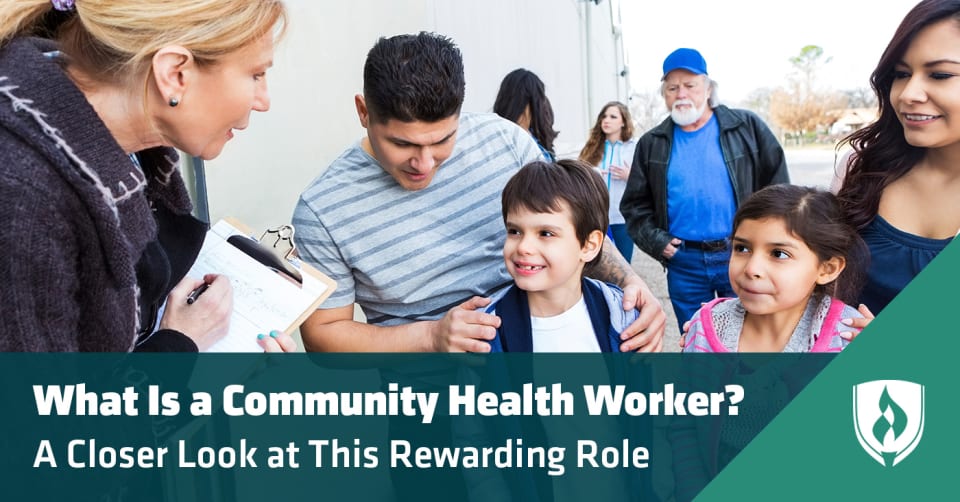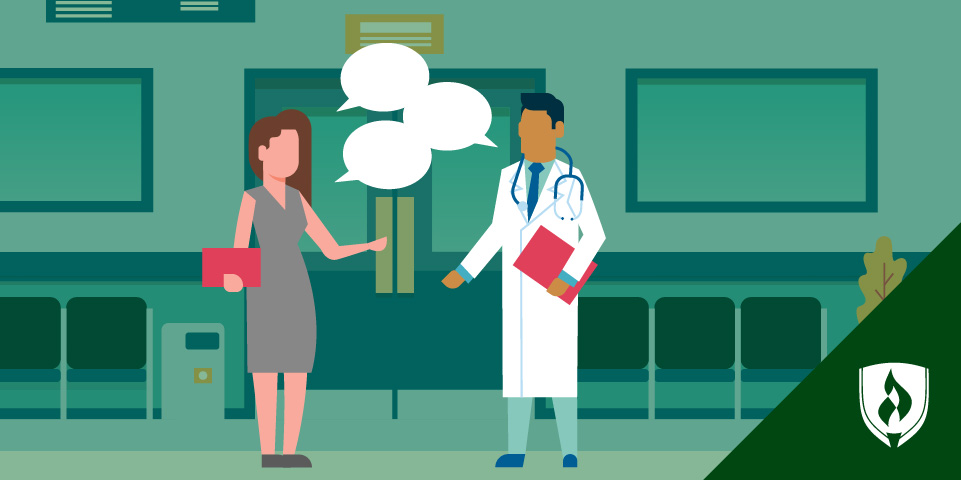What Is a Community Health Worker? A Closer Look at This Rewarding Role
By Callie Malvik on 09/16/2019

It’s always been important to you that people know what options they have in life. You’ve always cared about healthy living and are passionate about promoting it to others. You see the big picture and always know where to turn to find the right resources. People come to you for advice or directions on where to find great deals or helpful services.
If you’d label yourself a people-person and have a desire to help others improve their lives, you’ve probably considered a healthcare career. But you don’t have to pursue a “hospital” profession to get the patient interaction you’re craving.
Consider a career as a community health worker to fulfill your desire to help others. You can capitalize on your natural qualities to build a rewarding career supporting those in your own community. But what is a community health worker and how do you become one? Keep reading to find the answers you’re seeking.
What is a community health worker, exactly?
A community health worker (CHW) serves as a liaison between the community and the health care, government and social service systems. These are the people on the front lines, providing advocacy, education and support to civilians in order to help them improve their lifestyle and connect them with their proper healthcare options. They collect data and discuss health concerns with specific populations, according to the Bureau of Labor Statistics (BLS).1
Where do community health workers work?
Community health workers often live in the communities they serve, whether that’s rural, urban or somewhere in between. There is typically a larger need for CHWs in underprivileged, marginalized communities where resources are limited or there’s a lack of access to quality healthcare.
There is also variety when it comes to actual work settings for community health worker jobs. The BLS states that the most common places of employment are individual and family services, government agencies and religious or civic organizations.1
What are some common job duties of community health workers?
It should come as no surprise that the job duties can vary greatly depending on where a community health worker serves. Depending on the specific role, tasks could vary from staffing tables at community events, helping individuals complete applications to access health benefits, or conducting home visits to check on clients.
Here are some general job duties many community health workers take on1:
- Discuss health concerns with members of the community
- Provide informational counseling and social support
- Help people understand their health conditions
- Translate or interpret health information for clients
- Organize outreach programs
- Provide health screenings, referrals and educational materials
- Advocate for individual and community health needs
- Collect data and report findings to healthcare providers
Regardless of where community health workers work or what type of populations they’re serving, one thing remains constant: They devote their careers to helping educate and improve the health of their neighbors. If that’s a cause you can get behind, this might be the healthcare career you’ve been seeking.
How do you become a community health worker?
In order to carry out these widespread job duties, community health workers must have the proper training and education paired with the invaluable characteristics needed to build trusting relationships and deliver quality support. Here’s a closer look at what you’ll need to succeed in this career.
Education and training for community health workers
There is no standard education requirement for all community health worker jobs—this will vary depending on the type of position. Some entry-level positions can be attained with a high school diploma or an associate’s degree.1 More advanced positions may require a bachelor’s degree. This may also be true for specialized roles, such as a mental health community worker.
We used real-time job analysis software to examine more than 2,000 community health worker job postings from the past year.2 The data helped us identify the education levels employers are seeking in candidates. We found that 47 percent of job postings listed a bachelor’s degree as the preferred or minimum required education level.2
This means although it is possible to find community health worker jobs without a bachelor’s degree, acquiring one can help increase your job prospects or allow you to take on a more specialized role. Common fields to earn a degree in include health and wellness and public health. Some CHWs choose to progress their education while already working in the field in order to increase advancement opportunities.
You can also expect most community health worker positions to include some level of on-the-job training. Certain states may also require you to obtain a community health certification.
Skills and qualities for community health workers
There are certain skills and characteristics that most community health workers share. These skills can be honed through formal education or on-the-job training. But there are some innate qualities that CHWs are born with that make them a natural fit for the field.
Let’s start with the important skills needed to carry out the job duties we outline above. According to our job analysis, these are the most in-demand skills for community health workers:2
- Social services
- Case management
- Health education
- Behavioral health
- Public health and safety
- Appointment setting
- Treatment planning
- Medicare/Medicaid knowledge
- Health promotion programs
- Data entry
As we mentioned earlier, the skills listed above can be learned in a degree program or even on the job. But there are certain natural traits that lend themselves well to the field—things that can’t easily be taught. Here are five important qualities that many of the best community health workers possess:
- Relationship-building: In order to be most effective, community health workers often need to be entrenched within the communities they are serving. This is where relationship-building qualities come into play. If you’re someone who values connections with others and excels at nurturing those relationships over time, you might thrive as a community health worker.
- Empathy: Along those same lines, the most successful professionals in this field are those who have a genuine compassion for the individuals they are serving. For some, this empathy stems from growing up with similar circumstances. Others just have an innate ability to put themselves in the shoes of others.
- Trustworthiness: Once a relationship has been established, community health workers are entrusted with sensitive information regarding their clients. In order for individuals to feel comfortable confiding in you, you need to be honest, approachable and offer complete confidentiality.
- Persistence: A lot of the initiatives community health workers support are things that take time and stamina. Whether it’s advocating for community health needs or assisting individuals with social services applications, you’ll need to remain steadfast in your actions in order to see things through. The work isn’t always glamorous either, so a little grit and worth ethic will go a long way.
- Resourcefulness: There’s not always a clear-cut solution to the issues community health workers help to overcome. Sometimes you’ll have to get crafty to piece together the right resources to help an individual gain access to the care they need. It’s important to have a solid understanding of all of the possible options available and be able to navigate the landscape of healthcare, government and social services.
What other community health worker info should you know?
Most professionals in this field felt a calling to pursue a career as a community health worker. It’s typically not the earning potential or prestige that’s driving their decision. Even so, it’s important to know what to expect from a CHW career.
What is the job outlook for community health workers?
You’ll be happy to hear that community health worker jobs are on the rise. In fact, the BLS projects employment in this sector will increase 18 percent through 2026.1 This is more than two times faster than the national average for all occupations, which sits at 7 percent.
This optimistic outlook is partly due to the desire for governments, healthcare providers and social services providers to find ways to improve quality of care and health outcomes while reducing costs. The education and support CHWs provide can help mitigate avoidable health issues.
The BLS adds that job prospects may be more favorable for individuals who have a formal education, acquire certification, or those who speak a foreign language.
Make a difference as a community health worker
You now have a much deeper understanding of what a community health worker does and the profound impact they can have. If you could relate to the qualities described above, you may be naturally inclined to thrive in this rewarding role.
If you’re motivated to make a positive impact in your community, we can help equip you with the practical knowledge and training to complement the vital qualities you already possess. Learn more by visiting the Rasmussen University Health and Wellness page.
Related Articles:
1Bureau of Labor Statistics, U.S. Department of Labor, Occupational Outlook Handbook, [information accessed August 2019] www.bls.gov/ooh/. Employment conditions in your area may vary.
2Burning-Glass.com (analysis of 2,184 community health worker job postings by education level, Aug. 01, 2017 – Jul. 31, 2019).
CAREERS DISCLOSURE: Rasmussen University programs do not meet the educational requirements for professional licensure as a therapist, counselor, social worker, or other similar careers in any state.
EDITOR’S NOTE: This article was originally published in 2015. It has since been updated to include information relevant to 2019. Expert insight remains from original article.




